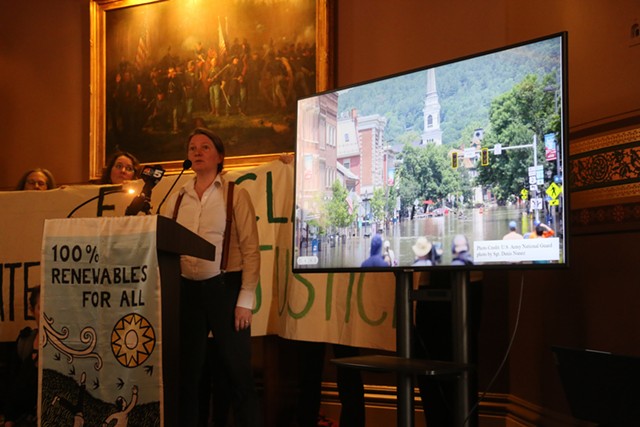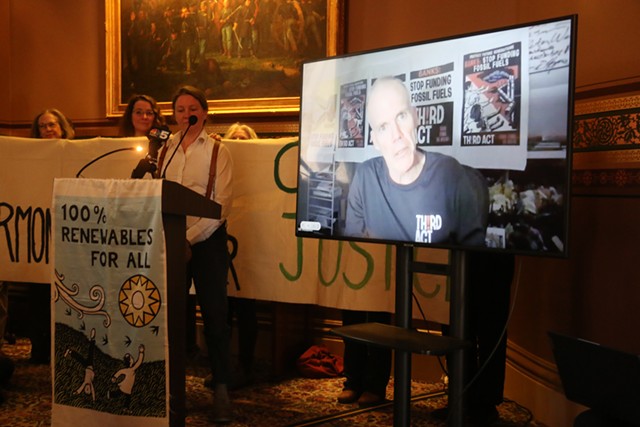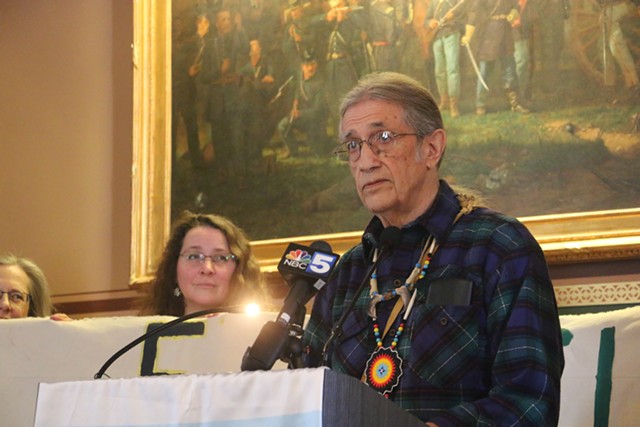
- Kevin McCallum
- Jessica Van Oort
Climate activists gathered at the Vermont Statehouse on Tuesday to push lawmakers to require utilities to get more of their power from renewable energy sources such as wind and solar.
Members of 350Vermont argued that the state’s renewable energy requirements are lagging behind those of other states and need fundamental reform to reduce fossil fuel emissions from the electricity sector.
The summer of wildfire smoke from Canada and devastating floods here have made it clear to Vermonters that more aggressive efforts to clean up the state’s power use is urgently needed, said Jessica Van Oort, a 350Vermont board member.
“If we don’t get off sources of energy that release greenhouse gas emissions into the atmosphere, what we’re experiencing right now is going to be magnified,” Van Oort said.
Vermont’s current renewable energy law, known as the Renewable Energy Standard, requires utilities to get 75 percent of their electricity from renewable sources by 2032. Of that, 10 percent must come from in-state systems built since 2015.
Environmental groups are pushing to update that law by increasing the goal to 100 percent renewable energy and to redefine what qualifies as renewable under the law.
The press conference took place the day before one of the final meetings of the Renewable Energy Standard Reform Working Group. The 16-member body is made up of lawmakers, utility representatives and environmental advocates with an interest in state energy policy.
The working group was formed after last year’s effort to reform state renewable energy rules stalled.
A bill backed by trade group Renewable Energy Vermont would have required utilities to get 100 percent of their electricity from renewable sources by 2030. It also would have doubled the amount of required in-state renewables to 20 percent by 2030 and tripled it by 2035.
 The bill faced fierce pushback from organizations such as the Burlington Electric Department, which opposed changes to the way renewable energy credits can be used.
The bill faced fierce pushback from organizations such as the Burlington Electric Department, which opposed changes to the way renewable energy credits can be used.
BED claims 100 percent of its energy comes from renewable sources. But it relies heavily on selling renewable energy credits from facilities it owns, such as the wood-fired Joseph C. McNeil Generating Station in Burlington, and backfilling them by purchasing less-expensive renewable energy credits from older hydroelectric facilities.
BED officials say the practice helps keep rates low.
The working group is expected to hone its recommendations on Wednesday and finalize them on December 5. Its suggestions will likely hold significant sway over the legislature as it debates the law next session.
350Vermont is pushing for an aggressive requirement that utilities get 60 percent of their electricity from new renewable sources by 2035.
Van Oort said that in many ways the state’s claims of being progressive on environmental and energy issues is a “false narrative.”
 “We have an opportunity right now in our state to not only change the emissions and social impacts of our electricity but to provide an example to the rest of the country about what is possible,” she said.
“We have an opportunity right now in our state to not only change the emissions and social impacts of our electricity but to provide an example to the rest of the country about what is possible,” she said.
350Vermont member Earl Hatley said the renewable energy law should only support "clean" energy technologies, such as wind and solar. It should not permit renewable natural gas, biomass, hydrogen, biofuels and large hydroelectric dams such as those affecting indigenous communities in Québec.
"Vermont does not need these false solutions," Hatley said.
The new law should also cap power bills at 6 to 10 percent of household income for low- to middle-income families, he said.
Rebecca Dalgin, a community organizer for 350Vermont, said such caps are needed because electricity rates may very well rise to accomplish the transition. A tax on the wealthy is one way to ensure the most vulnerable would not be harmed by rate increases, she said.
Ripton environmentalist Bill McKibben said in taped remarks that wind and solar energy are not only clean but “pretty cheap.” Concerns about the mining of minerals needed for things such as batteries and photovoltaic panels are legitimate, he said.
“But those things are far less destructive than the fossil fuel regime we’re in right now, McKibben said.
Members of 350Vermont argued that the state’s renewable energy requirements are lagging behind those of other states and need fundamental reform to reduce fossil fuel emissions from the electricity sector.
The summer of wildfire smoke from Canada and devastating floods here have made it clear to Vermonters that more aggressive efforts to clean up the state’s power use is urgently needed, said Jessica Van Oort, a 350Vermont board member.
“If we don’t get off sources of energy that release greenhouse gas emissions into the atmosphere, what we’re experiencing right now is going to be magnified,” Van Oort said.
Vermont’s current renewable energy law, known as the Renewable Energy Standard, requires utilities to get 75 percent of their electricity from renewable sources by 2032. Of that, 10 percent must come from in-state systems built since 2015.
Environmental groups are pushing to update that law by increasing the goal to 100 percent renewable energy and to redefine what qualifies as renewable under the law.
The press conference took place the day before one of the final meetings of the Renewable Energy Standard Reform Working Group. The 16-member body is made up of lawmakers, utility representatives and environmental advocates with an interest in state energy policy.
The working group was formed after last year’s effort to reform state renewable energy rules stalled.
A bill backed by trade group Renewable Energy Vermont would have required utilities to get 100 percent of their electricity from renewable sources by 2030. It also would have doubled the amount of required in-state renewables to 20 percent by 2030 and tripled it by 2035.

- Kevin McCallum
- Environmentalist Bill McKibben appearing via video
BED claims 100 percent of its energy comes from renewable sources. But it relies heavily on selling renewable energy credits from facilities it owns, such as the wood-fired Joseph C. McNeil Generating Station in Burlington, and backfilling them by purchasing less-expensive renewable energy credits from older hydroelectric facilities.
BED officials say the practice helps keep rates low.
The working group is expected to hone its recommendations on Wednesday and finalize them on December 5. Its suggestions will likely hold significant sway over the legislature as it debates the law next session.
350Vermont is pushing for an aggressive requirement that utilities get 60 percent of their electricity from new renewable sources by 2035.
Van Oort said that in many ways the state’s claims of being progressive on environmental and energy issues is a “false narrative.”

- Kevin McCallum
- Earl Hatley
350Vermont member Earl Hatley said the renewable energy law should only support "clean" energy technologies, such as wind and solar. It should not permit renewable natural gas, biomass, hydrogen, biofuels and large hydroelectric dams such as those affecting indigenous communities in Québec.
"Vermont does not need these false solutions," Hatley said.
The new law should also cap power bills at 6 to 10 percent of household income for low- to middle-income families, he said.
Rebecca Dalgin, a community organizer for 350Vermont, said such caps are needed because electricity rates may very well rise to accomplish the transition. A tax on the wealthy is one way to ensure the most vulnerable would not be harmed by rate increases, she said.
Ripton environmentalist Bill McKibben said in taped remarks that wind and solar energy are not only clean but “pretty cheap.” Concerns about the mining of minerals needed for things such as batteries and photovoltaic panels are legitimate, he said.
“But those things are far less destructive than the fossil fuel regime we’re in right now, McKibben said.
Correction, November 29, 2023: The Burlington Electric Department does not own the Kingdom Community Wind project in Lowell. A previous version of this post contained an error.










Comments
Comments are closed.
From 2014-2020, Seven Days allowed readers to comment on all stories posted on our website. While we've appreciated the suggestions and insights, right now Seven Days is prioritizing our core mission — producing high-quality, responsible local journalism — over moderating online debates between readers.
To criticize, correct or praise our reporting, please send us a letter to the editor or send us a tip. We’ll check it out and report the results.
Online comments may return when we have better tech tools for managing them. Thanks for reading.